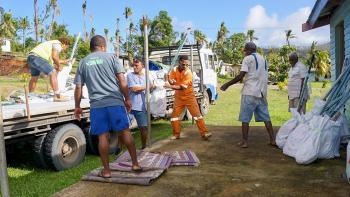Quick Facts
Individuals served in FY22: 55
- Through new construction – 55
Volunteers engaged in FY22: 37
Other facts:
- Population: over 929,700
- Life expectancy: 67 years
- Unemployment rate: 4.3 percent
- Population living below poverty line: 24.1 percent
Source: World Factbook
Habitat for Humanity in Fiji
Habitat for Humanity started working in Fiji in 1991. Since then, Habitat has helped over 70,000 people to build homes and hope through partnerships with governments, bilateral and non-profit organizations and international volunteers. Habitat works on a range of projects throughout the country including disaster response and recovery through repairs and temporary housing when needed, construction or improvement of water and sanitation systems in rural and remote areas, and disabled access housing projects. In the financial year ended June 30, 2018, Habitat for Humanity Fiji has helped more than 4,500 families through disaster response and over 2,000 families in more than 55 communities through water and sanitation improvements and built over 1,400 new houses to date.
The housing need in Fiji
Fiji is an archipelago of 332 islands, of which 110 are inhabited, spread over a land area of 18,300 square kilometers, and a geographic area of almost 50,000 sq. k.m. Fiji experiences frequent cyclones along with strong winds, rain, and storm surges. Climate change has increased disaster risks through sea-level rise, more intense storms, temperature extremes and droughts.
Rural-to-urban migration has escalated in the last decade with approximately 60% of Fiji’s population now living in urban areas. The mass movement has led to serious housing poverty. About 15% of Fijian households, or 120,000 to 140,000 people, were living in more than 170 informal settlements nationwide, according to Fiji’s fiscal review committee in 2023. The committee noted that formal housing construction nearly halved between 1998 and 2018. However, the value of formal housing supply in Fiji rose five-fold over the same period, to 10 times the average household income. For over three decades, Habitat for Humanity Fiji has partnered with more than 115,000 people to build or repair houses, rebuild after disasters, construct or improve water and sanitation systems in rural and remote areas, and implement housing projects involving people with disabilities.
How Habitat addresses the need in Fiji
Habitat for Humanity’s activities in Fiji range from new house construction to helping families rebuild after cyclones and other disasters to improving water and sanitation access in various communities. Habitat homes are typically built with a combination of locally supplied timber, concrete, and metal roofing. Families who partner with Habitat also contribute their own labor to build their new homes.
Water, sanitation and hygiene
Since 2010, Habitat Fiji has been constructing or improving water and sanitation systems in rural and remote communities. Funding support comes from bilateral donors such as UNICEF, Japanese Embassy and Australia’s Department of Foreign Affairs and Trade and New Zealand Aid through the Ministry of Foreign Affairs and Trade. Habitat trains the local communities to manage and conserve water resources and maintain water systems that have been installed. The program has assisted more than 5,000 families in close to 100 communities to date. Habitat Fiji completed the multi-year Australian-funded Water for Women project in early 2023. More than 980 households and a total of 1,140 children in schools in Ra and Ba provinces have improved their water, sanitation and hygiene, or WASH, conditions through improved facilities and training.
Disaster response and resilience
Habitat Fiji is one of the first responders during disasters. As part of the Pacific Task Force together with Habitat Australia and Habitat New Zealand, we have helped families hit by disasters such as 2015’s Cyclone Pam in Vanuatu. In responding to 2016’s Cyclone Winston, we exceeded the target by helping over 7,000 affected families through the distribution of emergency shelter kits. Programs in the recovery phase include community-based WASH training, cyclone retrofitting for homes, repairs and construction of houses and water and sanitation facilities and “Build Back Safer” training. In May 2019, Habitat partnered with the Fiji Shelter Cluster to launch the first country-specific toolkit for the coordination of shelter response. The “Fiji Shelter Handbook: Inclusive and Accessible Shelter Planning for Fijian Communities” was developed with the support of the Australian government through Habitat Australia. Habitat Fiji continues to help families rebuild following Cyclone Yasa in December 2020.
